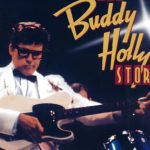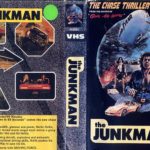The Russians dropped a bomb on the United States in 1957, Elvis became not only the king of rock and roll, but also the real autocrat of the only surviving city – the Lost Vegas. The wastelands that have become American lands are inhabited by tribes of savages and ambitious Ronin guitarists eager to replace the recently departed monarch. Ladies and gentlemen, a six-stringed samurai.
I don’t remember how and from whom I learned about this work, but the absurdity of the plot, the clear mixture of post-apocalyptic and young rock, made me smile. I watched it, experienced delight and curiosity. And another rare overwhelming and difficult to explain feeling. I decided to think about this feeling and about the film.
Many comments and reviews on it boil down to the cheapness of the production, the meaninglessness of the plot and even the lack of talent of the authors. I will object: cheapness was conceived by a graduate student of the directing department of Loyola University, Lance Mangia, who wanted to make a film for 25 thousand dollars.
I can’t argue with the “meaningless” grades. And not because they are true, but because they are not reasoned by any author. The plot of “Samurai” is clear, everything in it is according to the canon and strictly in chronological order. The plot — at the right time, it tells where the action is taking place, who the characters of the film are, what they want to achieve. This is clear in the tenth minute of the film. Conflict — obstacles arise in front of the heroes, the heroes get out of scrapes together, in which each new opponent is stronger than the previous one. The denouement — the heroes save the most valuable thing they have, the journey ends. I can’t call such a story meaningless.
There are many references to other films in the film, in this sense it is flesh of the flesh of postmodernism. These references, straightforward and understandable, lead to classic American tapes: “The Wizard of Oz”, “Dirty Harry”, “Mad Max”. The raspy voice and manner of the DJ on the radio accompanying the narration are reminiscent of the DJ from “American Graffiti” — Wolfman (“Wolf Man” or “Werewolf”) Jack, who in the post-apocalyptic reality is called a Werewolf (again, a “Werewolf”).
This elaboration of the details speaks about the love of the screenwriters (Lance Mangia and Jeffrey Falcon) for their creation, and not just about the desire to get a diploma. Manjia was 24 years old while working on the film, when he had only one well-received short film in his portfolio.
I have participated in a production for a graduate student director. I was called in the afternoon to shoot the play in the evening, because in the morning it had to be handed over to the commission for inspection. They told me to take a double bass with me. I played hypnotizing parts from the Doors and several rockabilly passages, at my discretion, being in the frame in the background. When we finished at 4 in the morning, everyone exhaled, I was told that it turned out well. I remembered this story for contrast. Mandziya and Falcon spent several months painting scenes. And if I listened to the opinion that “the guy just did his homework,” then after “just” I would add “great.”
The beginning and ending of the film are defined in my opinion unambiguously. But in the middle I see room for imagination. That’s how I saw the character of the boy David (Justin McGuire) — the name is heard in the last cries of his mother. He lives in the wasteland alone with his mother on the border of life and death. Despite his wildness, he manifests himself as a talented mechanic — he hacks a soda machine, drives a car. At the age of seven. These circumstances, not fictitious, but quoted from the screen, make the kid related to Anakin Skywalker from The Hidden Menace, which premiered in May 1999, nine months after the release of The Six-String Samurai. What is it? Foresight? Beginner’s luck?
The kid sits on the tail of the rock and roll shogun, to whom he is completely out of place. And although the horn-rimmed traveler does not try to teach the boy his arts, he adopts both courage and rock and roll. At the end of the story, he is ready to continue the work of the teacher. The teacher, whose katana is a direct allusion to the traditions of the samurai, and the hero’s ability to shoot down flying arrows with a sword and use music as a “force” is a Jedi skill.
Who is this kid if not the main character? Who is this kid, if not me at the age of 16, who fell ill with rock and roll and went on an endless journey with Gene, Eddie, Buddy and Elvis? Didn’t the apologists of not my music attack and try to break my attitude with beliefs and ridicule? But I went to my ball in Vegas, fighting off some, not paying attention to others.
The plot does not fall apart if you do not notice all these references. You can watch the movie according to your mood: on the microphone or “under the microscope”. When the filmmakers leave such space for the audience, I consider it a talented job. But to my chagrin, it seems that in the case of the “Six-String” the authors were just lucky. I was lucky to shoot a voluminous story on an expired film. I was lucky, because after Lance Mangia I didn’t make an interesting movie. I hope that only for now.
Falcon lived in Hong Kong for several years and worked as an actor in martial arts films. There he learned how to stage battle scenes. He and Maggia wrote the script together, Maggia thought over the shooting points, Falcon choreographed the battles. The battles are theatrical, the hero is invincible. Buddy Holly, who took lessons from Bruce Lee.
I find the plot simple and racing on musical fuel. The soundtrack of the “Six-stringed Samurai” can be added to the cast of the main roles. What is there in contemporary Russian music that is actually Russian? And the Western one? American? The musical “bomb” in 1957 in our reality was definitely not dropped by the Russians. But according to the plot of the film, the story went differently. What would have happened to music if American culture had stopped developing in 1957? What if the Russian musical tradition, which assimilated the beginnings of rock music, became dominant? Virtuoso mastery of instruments combined with a mocking, sometimes annoying and exaggerated Russian accent. It was such an ensemble that gained popularity in 1998.
Half of the soundtrack was written by the Red Elvis band, half by Brian Tyler with the participation of the same Elvises. Tyler, who later wrote music for Transformers, Iron Man 3, and The Avengers, began his musical career in 1997 in independent films, and Samurai was his second work. Tyler, using instrumental bundles, glued thematically disparate Elvis songs into one canvas:
In 2016, “Red Elvises” came to Tyumen with a concert. “The Boredom Breakers” played the opening act, thanks to which I got on the show. Until that evening, I had only heard songs from Samurai performed by them. The concert consisted of two-thirds of them. Either these are the best things of the group, or the film itself reached the Russian audience more, so they were included in the program. I couldn’t have found a better ensemble for “Six-String Samurai” in 1998.
The director wanted to make a deliberately cheap movie in the sense of production, a movie that would not look cheap in the sense of effect. But even with the free film and camera, inventory and clothes collected in landfills, Lance and Jeffrey did not have enough money. There wasn’t enough time — they shot most of it only on weekends, because Justin, who played the boy, couldn’t skip school on weekdays. I had to hurry, because at this rate the kid could have ended up in college by the finals. Manjia from the footage — about 20 percent of the total screen time — mounted the trailer, which still looks exciting today. With the trailer, the authors went to look for sponsors.
As a result, they received two million dollars from the Hollywood Stock Exchange (HSX), an online platform that issues virtual stocks and movie bonds. It can be compared with the current sponsorship services, where people transfer money to the project they like and receive bonuses for it. At HSX, the owners of “securities” received T-shirts, baseball caps with logos and other fan paraphernalia. And that was in 1998. In such an innovative way, during the nascent Internet commerce, the authors received money and were able to complete the project.
I, with such, on the one hand, justified, on the other, pure feelings for the film, was offended by the fact of its “niche” (sometimes, smoothing out the corners, it is called “cult”, which, in my opinion, is incorrect here) – and an irrefutable commercial failure. What happened at the box office in August–September 1998? “Blade”, “Urban Legends”, “Ronin”, “Pleasantville” came out. The first part of “Rush Hour” with “Six—string Samurai” was released on the same day – September 18. The opponents are too strong for a guy who did his homework. “Samurai” collected 135 thousand dollars, when “Rush Hour” — 245 million.
But was there anything else besides unequal competition and weak promotion?I have a “conspiracy” hypothesis. The rental failed because of the genuine patriotism of the Americans, their attitudes that did not imply the slightest chance, if not humiliation, of the scenario described in the beginning of the “Six-String”.
“Did the Russians bomb the USA? What an absurdity!”
The film, intended to be the last in a trilogy, was supposed to receive two prequels. But he remained lonely, like his hero. Among the comments on “The Six—Stringed Samurai” on film platforms, it is widely believed that the film sucks. I disagree, and here’s why: The “six-stringed samurai” has something to say. Yes, amid the hubbub of the 1998 blockbusters, his words sounded like a whisper. But some people heard him. To this day, what was said by “Samurai” is passed from mouth to mouth. No matter what they call it: amateur, cheap, empty as a hero’s guitar case, an unrecognized genius, the final masterpiece of the post—apocalyptic era, “Six-String Samurai” is an event, whether you like it or not, that will never happen again.



































Definitely a cult classic that deserves it. The film, of course, is not a masterpiece, but it is the only one of its kind. It is recommended to everyone, but fans of the post-apocalypse and rock’n’roll must watch, fans of the Fallout game must watch even more, especially fans of the New Vegas part.
I’ll never forget how the commander of the Soviet (sort of) soldiers forgotten in the desert says in Russian, “Bitch, fuckers, goats!” and the subtitles translate into English, “This will not be as easy as I’ve thought!”
Plus, I want to mention that the Red Elvises not only wrote the music for the film, but also personally appear on the screen as one of those who are trying to kill the main character. But it’s true, by the way. It’s a great movie overall. To everyone who hasn’t watched, it’s worth a look, you won’t regret it.